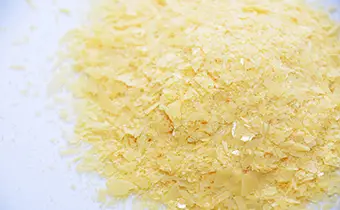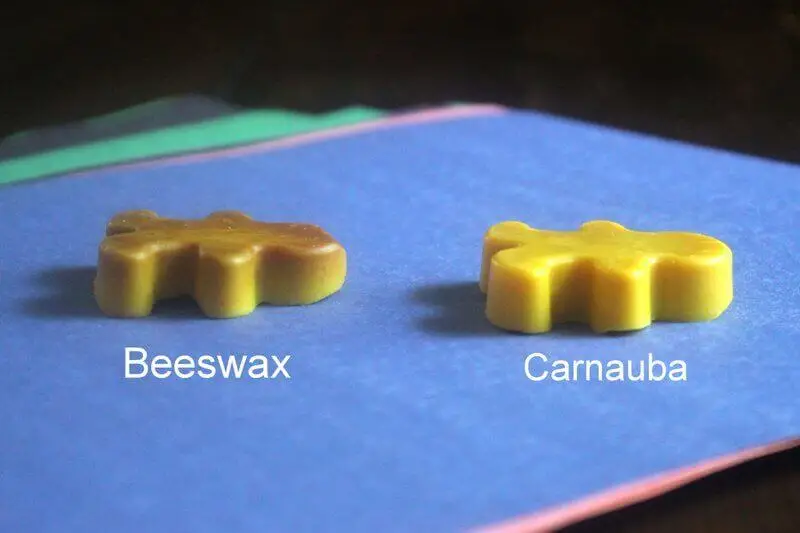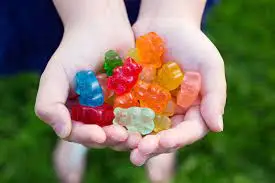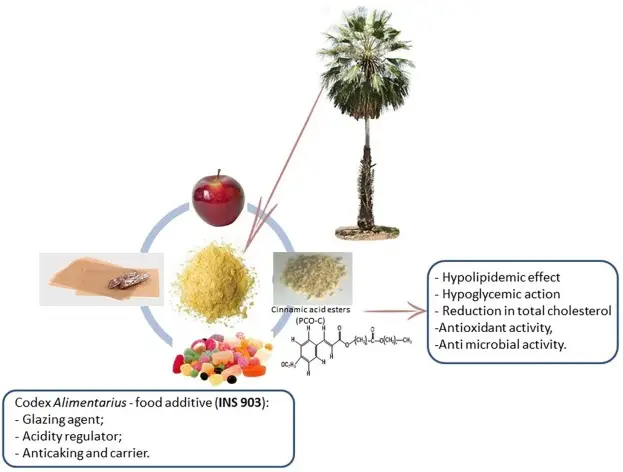Yes, Carnauba wax is certainly vegan. It is made from Brazilian palm tree leaves and doesn’t include any components or byproducts that come from animals. Carnauba wax is frequently utilized in a variety of goods. This includes food, cosmetics, and DIY cosmetics, and is regarded as a sustainable and vegan-friendly alternative.
However, the sourcing process of the carnauba wax raises some ethical controversies. To know more about the edible applications of carnauba wax and veganism continue reading this article-
Key Take Aways
- Is Carnauba Wax Vegan? What Makes It Vegan?
Yes, All the ingredients used to make Carnauba wax make it vegan.
- Applications of Carnauba Wax in Edible Products.
The applications of carnauba wax a vast. You use Carnauba wax as Candy Coating, Fruit and Vegetable Coatings, Edible films and packaging, Pills and tablets, Dessert toppings, and many more.
- Carnauba Wax: Ethical Controversies and Concerns
Carnauba wax generally is considered a vegan-friendly and sustainable product. While that is true, there are some ethical and environmental concerns regarding that.

Is Carnaba Wax Vegan?
Carnauba wax is indeed vegan. The ingredients in Carnauba wax make it vegan-friendly. Carnauba wax is widely used in a variety of products, including food, cosmetics, and DIY cosmetics. I.
What Makes Carnauba Wax Vegan?
Carnauba Wax is made from Brazilian palm tree leaves. It has no animal ingredients or byproducts, which makes it vegan.
- Carnauba Wax Ingredients
- Esters of fatty acids (80-85%): These are the main component that gives carnauba wax its waxy texture.
- Fatty alcohols (10-15%): These major components of carnauba wax contributes to its moisturizing properties in skin care products.
- Acids (3-6%): These are present in smaller amounts and can contribute to the acidity of carnauba wax.
- Hydrocarbons (1-3%): These can contribute to the water-repellent properties of carnauba wax.
- Esterified fatty diols (about 20%): These are specific to carnauba wax and contribute to its unique properties.Properties like its hardness, gloss, and water resistance.
- Hydroxylated fatty acids (about 6%): These contribute specifically to carnauba waxes emulsifying properties. This stabilizes the oil and water system of the product.
- Cinnamic acid (about 10%): An antioxidant that is specific to carnauba wax. This contributes to its protective properties.
Carnauba Wax vs Beeswax

beeswax wraps are eco-friendly and biodegradable and non-toxic. This quality makes it a popular way to package fresh produce like fruits and vegetables. Beeswax wrap is a sustainable and biodegradable alternative to plastic wrap. However, beeswax is a non-vegan product. This is because it is produced by bees and the pollen they collect from flowers. In other words, Beeswax is an animal-diverted product.
In contrast, carnauba wax is a popular vegan substitute to beeswax. It has a wide range of use in the food industry, including coating and packaging.
Applications of Carnauba Wax in Edible Products

The natural plant-based carnauba wax is widely used in the food industry. The physicochemical characteristics of this wax make gives it such popularity. Here are some common uses of carnauba wax in edible products.
- Candy Coating: Carnauba wax is used as a coating or glazing agent for candies and chocolates in the culinary business. M&Ms and other candies frequently include it.
- Fruit and Vegetable Coatings: Carnauba wax is used as a coating on fresh fruits and vegetables to maintain their aesthetic appeal. Also to keep the freshness intact during the shipping process.
- Gummy candies and fruit snacks: It is used to add texture and durability to gummy candies and other fruit snacks.
To know about instructions on coating gummies, Check this video out Coating Gummies, 3 Easy Techniques for Extending Shelf Life. WTF – Ep. 324
- Edible films and packaging: It is used to prepare edible films. Super-hydrophobic and biodegradable packaging is also made using carnauba wax.
- Pills and tablets: In the pharmaceutical sector, it is utilized as a coating.
- Dessert toppings: Carnauba wax is often used on dessert toppings.
It is safe to say that carnauba wax is a popular product used in the vegan dessert industry. Try these articles for additional information on Vegan desserts-
| Product name | Feature |
| Nuvia Organics | -USDA Certified Carnauba Wax-100% Vegan – Food Grade |
Carnauba Wax: Ethical Controversies and Concerns

Carnauba wax generally is considered a vegan-friendly and sustainable product. While that is true, there are some ethical controversies and concerns regarding that. Here’s what you should know:
Ethical And Environment Concerns:
- There are reports of poor working conditions and low pay for the workers in the industry
- There is a negative ecological impact on the Amazonian rainforest. This is due to the overharvesting of carnauba palm trees.
- Threats to local biodiversity that may have an impact on carnauba tree regeneration and the future of carnauba wax production.
- Carnauba palm tree cultivation causes deforestation and habitat loss.
- Carnauba palm tree cultivation harms wildlife and ecosystems.
Does Carnauba Wax Have Any Health Concerns
Carnauba is generally safe for consumption and digestion. Carnauba wax was evaluated as a food additive by the European Food Safety Authority (EFSA). They determined that it is safe at current usage levels.
However, like with any product, it is vital to be aware of potential dangers. So, use carnauba wax in moderation and accordance with the manufacturer’s recommendations.
The potential health risks related to carnauba wax on certain people include dizziness, nausea, blurred vision, and eye burning.
Alternative to Carnauba Wax:
Several vegan alternatives to Carnauba wax can be used in edibles. Here are some options:
- Candelilla Wax: Candelilla wax has a high melting point and is often used in chocolate and other confections.
- Soy Wax: On food items, soya wax is utilized as a protective coating.
- Rice Bran Wax: In edible items, rice bran wax is a vegan alternative to beeswax and carnauba wax.
- Sunflower Wax: Sunflower wax is used as a coating or glazing agent for edibles.
- Jojoba Wax: In edible items, rice bran wax is a vegan alternative to beeswax and carnauba wax.
Frequently Asked Questions
Does Carnauba Wax Have Any Nutritional Value?
Carnauba wax has no nutritional value because it is not intended to be digested by the body. Its primary function is to produce a protective layer and shine.
How Can I Identify Products With Carnauba Wax?
Examine the ingredient list for the term “carnauba wax.” It is frequently referred to as “E903” in European Union countries, and it may also be referred to as “palm wax” in other cases.
Are Animal Products Used in the Manufacturing of Edible Carnauba Wax?
No, edible carnauba wax is typically produced without the use of animal products. However, it is critical to read product labels carefully for any potential non-vegan components.
Bottom Line
The answer is a resounding yes to the question “Is Carnauba Wax Vegan?“
Carnauba wax has ranging applications from candy coatings and fruit preservation to pharmaceuticals and packaging. However, it is critical to understand the ethical and environmental issues related to its cultivation and influence on local ecosystems.
- How Long Does Vegan Butter Last? Mystery Solved - January 9, 2024
- How Long Does Vegan Mayo Last - January 2, 2024
- From Pot to Plate: How Long Does Vegan Chili Last in The Fridge? - December 26, 2023
